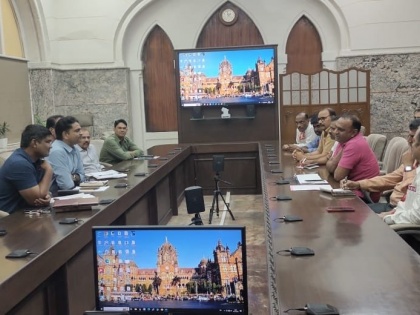Mumbai's Central Railway Motormen Seek Fair Treatment and Improved Safety
By Nirmeeti Patole | Published: February 12, 2024 06:46 PM2024-02-12T18:46:11+5:302024-02-12T18:47:24+5:30
In the wake of the tragic death of motorman Murlidhar Sharma at Byculla station, the struggles faced by Central ...

Mumbai's Central Railway Motormen Seek Fair Treatment and Improved Safety
In the wake of the tragic death of motorman Murlidhar Sharma at Byculla station, the struggles faced by Central Railway's Mumbai division motormen have gained prominence. These dedicated workers, responsible for the safe operation of trains, are grappling with a myriad of issues, including punitive measures for signal violations, excessive workload, job insecurity, and perceived neglect by railway authorities. Sharma's demise, allegedly preceded by breaching a red signal, has sparked outrage among motormen and railway unions who argue that such infractions often stem from intense job pressures rather than willful negligence. The prescribed penalties for Signal Passing at Danger (SPAD) by Indian Railways, ranging from compulsory retirement to demotion, are viewed as disproportionately harsh, particularly considering the complexities of navigating Mumbai's intricate signal systems and challenging operational conditions.
A Mumbai Division Motorman told LokmatTimes.com, “Railway has limited sources and infrastructure. Ideally all signals should be on left hand side. But the signal system is very complex. Inter-distance signal has been reduced now. How can a single motorman cover the distance of 240 km alone in such a flawed system? Though there is assistant driver, the motorman is under immense pressure if the signal violation takes place.” There are some signals which are at slums, mountains and the reaction time is very less. Sometimes, wrong line signal gets picked up due to curvatures, halts, short distances between signals and public distractions, trespasses etc. They have to gain speed with minimum time, look at the overhead wires, tracks, horns and ensure the train coach position is perfect.
“We are under immense stress while we are riding the train. If the signal violation takes place by mistake and there is no loss of human life or railway property, then norms in the accident manual should be changed by the railway board. We are not telling to overlook the rules but administration should treat us with human approach. We have to perform double shifts as there are less vacancies. There is uncertainty of our job as few mistakes can lead to harsh punishments like loosing our jobs,” informed the motorman. He informs that the Mumbai division runs more trains as compared to other divisions. Talking about the struggles the motormen face in balancing their personal and professional life, a rail employee told, “We consume less water on duty as we don’t have time for lunch brakes. There is no social life at all. If we have to take big decisions related to our children’s education, then we have to think twice as this job is very uncertain. What to do if there is a technical fault and allegations are put on me? I will loose my job.”
Madhu Kotian, President of Mumbai Rail Pravasi Sangh , Fighting for Rights of Railway commuters told LokmatTimes.com, “Present situation of motormen is very difficult. They are required to do overtime even after completing 12 hours. Hence, their working capacity is been weakened. Signaling system should be improved. This is a risk factor affecting both motormen and safety of passengers.” Sharma's tragic accident has catalyzed calls for reflection within the railway administration, prompting a special meeting convened by the Chief Divisional Railway Manager (DRM) to address the grievances of motormen. With promises of dialogue and action, there is hope for meaningful reforms to alleviate the burdens faced by these essential workers and ensure a safer, more equitable railway environment.
Open in app